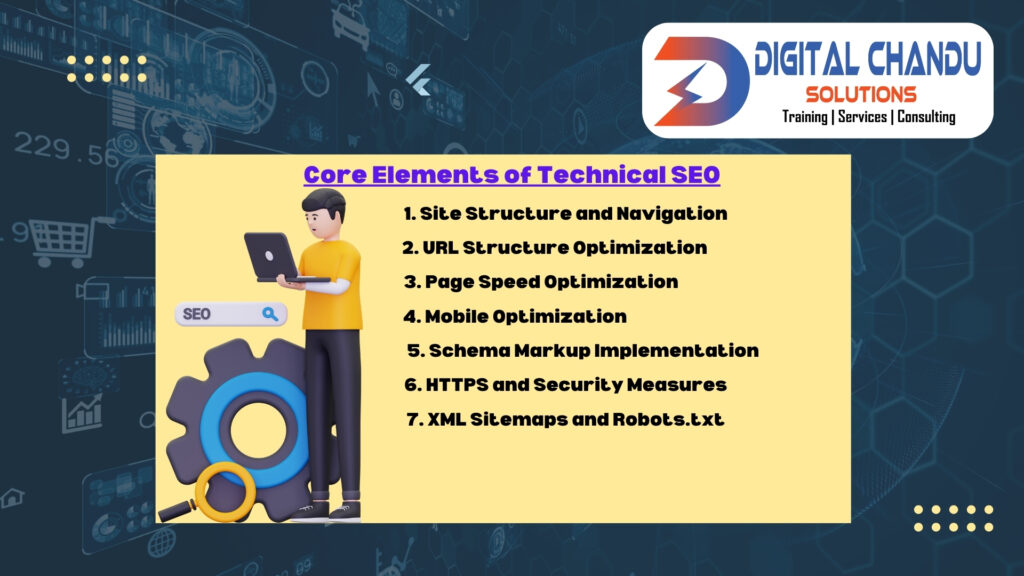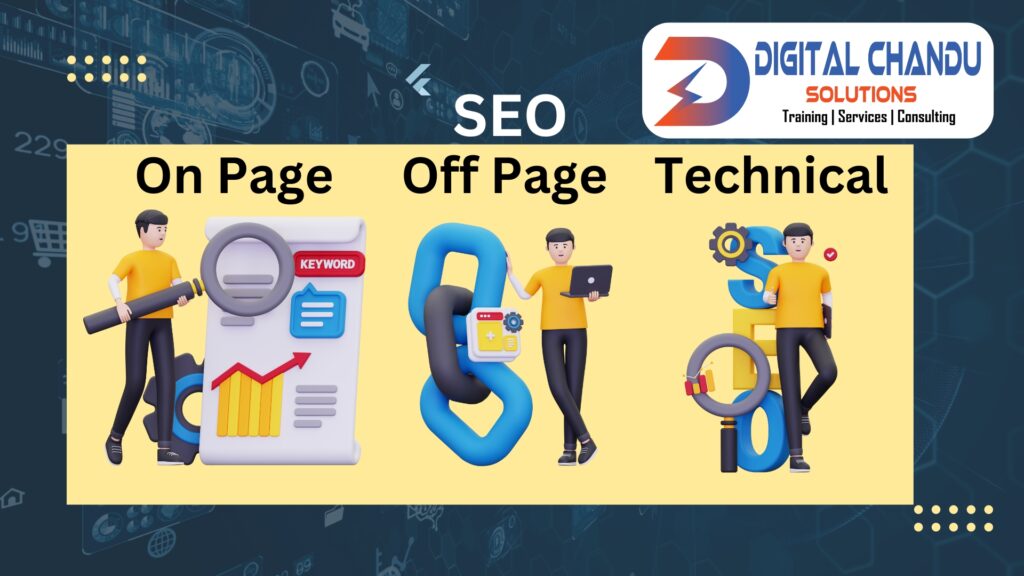Understanding Technical SEO: A Complete Guide
In the vast world of digital marketing and search engine optimization (SEO), a crucial aspect often goes unnoticed by many beginners and even seasoned professionals – Technical SEO. While content creation and backlinking strategies are essential, overlooking technical SEO can significantly hinder a website’s performance in search engine results pages (SERPs). In this comprehensive guide, we’ll delve deep into technical SEO, exploring its significance, core elements, best practices, common mistakes to avoid, tools for analysis, and future trends.
What is Technical SEO?
Technical SEO refers to optimizing a website’s technical aspects to enhance its visibility and ranking on search engines. Unlike traditional SEO, which focuses on content quality and backlinks, technical SEO deals with a website’s backend structure and functionality. It ensures that search engine crawlers can access, crawl, and index the site efficiently, leading to better organic traffic and improved user experience.

Why Technical SEO is Important
Technical SEO is paramount for several reasons:
Crawlability and Indexation: A well-optimized technical setup ensures that search engine bots can crawl and index all relevant pages on your site, making your content discoverable to users.
Site Speed and Performance: Technical optimizations like optimizing images, minimizing CSS and JavaScript files, and leveraging caching mechanisms improve page loading times, contributing to a positive user experience and higher rankings.
Mobile-Friendliness: With the increasing use of mobile devices, ensuring your site is mobile-friendly is crucial for SEO success. Responsive design and mobile optimization techniques fall under technical SEO.
Structured Data and Rich Snippets: Implementing structured data markup helps search engines understand your content better, leading to rich snippets in search results, which can improve click-through rates.
Security and HTTPS: Securing your website with HTTPS protects user data and earns trust from users and search engines, potentially boosting your rankings.
What are Core Elements of Technical SEO
To gain a comprehensive understanding of Technical SEO, it’s essential to explore its core elements and strategies:
1. Site Structure and Navigation
A well-structured website with intuitive navigation enhances user experience and facilitates search engine crawling. Key considerations include:
Logical hierarchy: Organize your content into categories and subcategories for a clear hierarchy.
Internal linking: Use internal links strategically to guide users and search engines to relevant pages.
User-friendly URLs: Optimize URLs to be descriptive, concise, and include relevant keywords.
2. URL Structure Optimization
URL optimization is crucial in user experience and search engine visibility. Best practices include:
Keyword inclusion: Incorporate relevant keywords in URLs to improve visibility for related searches.
Hyphen usage: Use hyphens (-) to separate words in URLs for readability and search engine parsing.
Avoidance of dynamic parameters: Minimize using dynamic parameters in URLs, as they can create duplicate content issues.
3. Page Speed Optimization
Page speed is a critical ranking factor and directly impacts user satisfaction. Strategies for optimizing page speed include:
Image optimization: Compress images without compromising quality to reduce loading times.
Minification of resources: Minimize CSS, JavaScript, and HTML files to reduce file size and improve loading speed.
Caching mechanisms: Leverage browser and server-side caching to store frequently accessed resources for faster retrieval.

4. Mobile Optimization
Given the exponential growth of mobile users, optimizing your website for mobile devices is imperative. Key considerations include:
Responsive design: Ensure that your website adapts seamlessly to different screen sizes and devices.
Mobile-friendly content: Create content that is easy to read and interact with on mobile devices.
Accelerated Mobile Pages (AMP): Implement AMP for faster loading times and improved mobile experience.
5. Schema Markup Implementation
Implementing structured data markup using Schema.org vocabulary provides search engines with additional context about your content. This can lead to rich snippets in search results, such as star ratings, reviews, and FAQs, enhancing visibility and click-through rates.
6. HTTPS and Security Measures
Securing your website with HTTPS encryption protects user data and signals trustworthiness to search engines. Additional security measures, such as regular software updates, strong passwords, and firewall protection, contribute to a secure and reliable online presence.
7. XML Sitemaps and Robots.txt
XML sitemaps help search engines discover and index your website’s pages more efficiently. Meanwhile, the robots.txt file instructs search engine crawlers on which pages to crawl and which to avoid, ensuring proper indexing and crawl budget allocation.
How technical SEO works with Example
Example: TechTrends E-commerce Website
Improved Search Engine Rankings:
TechTrends focuses on Technical SEO by optimizing its product pages with relevant keywords in titles, meta descriptions, and headings.
The website implements schema markup for products, including details like price, availability, ratings, and reviews, which helps search engines understand and display rich snippets in search results.
By optimizing for technical factors like site speed, mobile responsiveness, and structured data, TechTrends achieves higher rankings for keywords related to its products, such as “latest tech gadgets” or “best smartphones of 2024.”
Increased Organic Traffic:
With improved search engine rankings, TechTrends experiences a significant increase in organic traffic as more users discover and click on its optimized product pages.
Technical SEO efforts ensure that search engine bots can crawl and index all product pages efficiently, leading to better visibility in search results and more clicks from interested users.
Enhanced User Experience:
TechTrends optimizes the user experience by ensuring fast loading times for product pages, easy navigation with clear categories and filters, and a mobile-friendly design.
Users find browsing and purchasing products on TechTrends’ website convenient, leading to longer session durations, lower bounce rates, and higher engagement metrics.
Mobile Optimization:
Knowing that a significant portion of its traffic comes from mobile devices, TechTrends prioritizes mobile optimization.
The website’s responsive design ensures product pages adapt seamlessly to different screen sizes, providing a consistent and user-friendly experience across devices.
Structured Data and Rich Snippets:
TechTrends implements structured data markup for product details, allowing search engines to display rich snippets in search results.
Users see additional information like product ratings, prices, and availability directly in search snippets, making TechTrends’ listings more appealing and increasing click-through rates.
Site Security and Trustworthiness:
TechTrends secures its website with HTTPS and SSL/TLS certificates to build trust and credibility, ensuring encrypted data transmission for users.
Trust signals like security badges, customer reviews, and clear privacy policies enhance the website’s reputation and encourage user confidence.
Optimized Crawlability and Indexation:
TechTrends creates XML sitemaps for its product pages and optimizes robots.txt files to guide search engine crawlers efficiently.
By fixing crawl errors, ensuring proper indexation of all relevant pages, and avoiding duplicate content issues, TechTrends maximizes its visibility and ranking potential in search results.
Better Conversion Rates:
As a result of Technical SEO efforts, TechTrends experiences improved conversion rates as users find relevant products easily, trust the website’s security and credibility, and have a seamless shopping experience from search to checkout.
Best Practices for Technical SEO
To ensure optimal technical SEO performance, follow these best practices:
Regular Site Audits: Conduct regular audits to identify technical issues such as broken links, crawl errors, and duplicate content.
Mobile Optimization: Prioritize mobile optimization to cater to increasing mobile users.
Page Speed Optimization: Optimize page loading times for better user experience and search engine rankings.
Schema Markup: Implement structured data markup to enhance search results with rich snippets.
Security Measures: Secure your website with HTTPS, strong passwords, and regular security updates to protect against cyber threats.
XML Sitemaps and Robots.txt: Ensure that XML sitemaps are updated and robots.txt is correctly configured to guide search engine crawlers.
Content Optimization: Optimize on-page content with relevant keywords, meta tags, and structured data to improve visibility.
Common Mistakes to Avoid in Technical SEO
While optimizing for technical SEO, be mindful of these common mistakes that can negatively impact your website’s performance:
Ignoring Mobile Optimization: Failing to optimize for mobile devices can lead to poor user experience and lower rankings.
Slow Page Speed: Overlooking page speed optimization can result in high bounce rates and reduced search visibility.
Incomplete or Incorrect Schema Markup: Improper implementation of structured data markup can lead to misinterpretation by search engines.
Security Vulnerabilities: Neglecting website security measures can compromise user data and trust, affecting SEO rankings.
Ignoring Crawl Errors: Failure to address crawl errors and broken links can hinder search engine bots’ ability to index your site effectively.
Tools for Technical SEO Analysis
Several tools can aid in analyzing and improving your website’s technical SEO performance:
Google Search Console: Provides insights into indexing status, crawl errors, and search performance.
Google PageSpeed Insights: Evaluates page speed and offers optimization suggestions.
SEMrush: Offers comprehensive SEO audits, keyword research, and competitor analysis.
Moz Pro: Provides SEO insights, site audits, and rank-tracking tools.
Ahrefs: Offers backlink analysis, keyword research, and site audit features.
Difference Between On-Page SEO & Off-Page SEO & Technical SEO

On-Page SEO:
Definition: On-page SEO optimizes individual web pages to improve search engine rankings and attract organic traffic.
Key Elements:
Keyword Optimization: Including relevant keywords in page titles, headings, meta descriptions, and content.
Content Quality: Creating high-quality, valuable content that meets user intent and engages readers.
Meta Tags: Optimizing meta tags like title tags and meta descriptions for better visibility in search results.
URL Structure: Creating SEO-friendly URLs that are descriptive and include target keywords.
Internal Linking: Linking to relevant pages within your website to improve navigation and distribute link equity.
User Experience (UX): Ensuring a positive user experience with fast loading times, mobile responsiveness, and easy navigation.
Goal: To enhance individual web pages’ relevance, quality, and user experience for better search engine rankings and user engagement.
Off-Page SEO:
Definition: Off-page SEO refers to activities performed outside your website to improve its online reputation, authority, and backlink profile.
Key Elements:
Link Building: Acquiring high-quality backlinks from reputable websites to improve domain authority and search engine rankings.
Social Media Marketing: Promoting your content on social media platforms to increase visibility, shares, and engagement.
Online Reputation Management: Managing reviews, mentions, and brand perception across the web to build trust and credibility.
Guest Blogging: Write guest posts for other websites to gain exposure, backlinks, and authority in your industry.
Influencer Marketing: Collaborating with influencers to reach a wider audience and amplify your brand’s visibility.
Goal: To build authority, credibility, and trustworthiness for your website through external signals like backlinks, social mentions, and positive reviews.
Technical SEO:
Definition: Technical SEO focuses on optimizing the technical aspects of your website to improve its crawlability, indexation, and overall performance in search engines.
Key Elements:
Site Structure: Creating a clear and organized site structure with logical hierarchy and navigation.
URL Optimization: Optimizing URLs for readability, keyword inclusion, and proper redirects (e.g., 301 redirects for page changes).
Page Speed Optimization: Improving loading times with techniques like image optimization, caching, and minimizing CSS/JavaScript.
Mobile-Friendliness: Ensuring that your website is responsive and user-friendly on mobile devices.
Schema Markup: Implementing structured data markup to enhance search engine understanding of your content and generate rich snippets.
Security: Securing your website with HTTPS, SSL/TLS certificates and implementing security measures to protect user data.
Goal: To ensure that search engine crawlers can access, crawl, and index your website efficiently, improving rankings, visibility, and user experience.
Digital Chandu Solutions: Expert Services and Training in Technical SEO
At Digital Chandu Solutions, we specialize in providing comprehensive services and training programs focused on Technical SEO. Whether you’re looking to enhance your website’s search engine visibility or expand your knowledge and skills in Technical SEO, we have the expertise and resources to meet your needs.

Services Offered
1. Technical SEO Audits
Our team conducts thorough Technical SEO audits to assess the health and performance of your website from a technical standpoint. We identify issues such as crawlability, indexation, site speed, mobile-friendliness, URL structure, schema markup, and more. Our audits provide actionable insights and recommendations to improve your website’s technical foundation.
2. On-Page Optimization
We optimize on-page elements, including meta tags, headings, content structure, internal linking, and keyword usage, to align with best SEO practices and enhance search engine visibility. Our goal is to ensure that your website’s content is relevant and well-optimized for search engine algorithms.
3. Mobile Optimization
With mobile devices accounting for a significant portion of internet traffic, we prioritize mobile optimization strategies to improve user experience and search engine rankings. Our mobile optimization services include responsive design implementation, mobile-friendly content creation, and page speed optimization for mobile devices.
Training Programs
In addition to our services, we offer comprehensive training programs in Technical SEO for individuals and businesses looking to expand their knowledge and skills. Our training curriculum covers the following topics:
1. Fundamentals of Technical SEO
Understanding search engine algorithms and ranking factors
Basics of website architecture, crawlability, and indexation
Importance of mobile optimization and responsive design
Introduction to structured data markup and rich snippets
2. Advanced Technical SEO Strategies
Conducting Technical SEO audits and analysis
Optimizing website speed and performance
Implementing HTTPS, SSL/TLS certificates, and security measures
Leveraging advanced techniques for mobile optimization and structured data implementation
3. Practical Implementation and Tools
Hands-on exercises and case studies for real-world application
Using tools such as Google Search Console, Google PageSpeed Insights, SEMrush, Moz Pro, and Ahrefs for Technical SEO analysis
Best practices for on-page optimization, URL structure, and site architecture
FAQ’s
1. What is Technical SEO?
Technical SEO refers to optimizing the technical aspects of a website to improve its search engine visibility and performance. It involves site structure optimization, mobile optimization, page speed improvement, and implementing structured data markup.
2. Why is Technical SEO important?
Technical SEO is crucial because it ensures search engines can crawl, index, and understand your website’s content effectively. It directly impacts your site’s ranking, visibility in search results, and overall user experience.
3. What are some key elements of Technical SEO?
Key elements of Technical SEO include site structure and navigation, URL structure optimization, page speed optimization, mobile-friendliness, structured data implementation, HTTPS and security measures, XML sitemaps, and robots.txt optimization.
4. How does Technical SEO differ from On-Page SEO and Off-Page SEO?
Technical SEO deals with optimizing the technical aspects of a website.
On-page SEO optimizes individual web pages for relevant keywords and user experience.
Off-page SEO involves building backlinks and online reputation through external sources.
5. What are some common Technical SEO issues?
Common Technical SEO issues include:
- Crawl errors.
- Duplicate content.
- Broken links.
- Slow page loading speed.
- Improper URL structure.
- Mobile usability issues.
- Need to include alt tags for images.
- Insecure HTTP connections.
6. How can I improve my website’s Technical SEO?
To improve Technical SEO, you can:
Conduct a comprehensive technical audit to identify and fix issues.
Optimize site structure, URLs, and internal linking.
Improve page loading speed and mobile-friendliness.
Implement structured data markup and HTTPS encryption.
Monitor crawl errors and XML sitemap health.
Use tools like Google Search Console, Google PageSpeed Insights, and SEO crawlers for analysis.
7. What role does site speed play in Technical SEO?
Site speed is a critical factor in Technical SEO as it directly impacts user experience and search engine rankings. Fast-loading websites are favored by search engines and users, leading to higher visibility and better conversion rates.
8. Is Technical SEO a one-time task or an ongoing process?
Technical SEO is an ongoing process that requires regular monitoring, updates, and adjustments. Search engine algorithms evolve, and website technologies change, so continuous optimization is necessary to maintain optimal performance.
LEARN MORE

